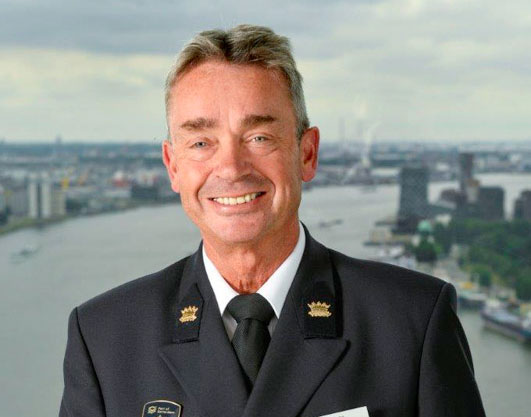
In 1554, Maerten Jacobsz Wildehaer became the first harbour master of Rotterdam. His present-day counterpart is State Harbour Master René de Vries. Since 1 March 2010, he is responsible for the Harbour Master Division, which to some extent is part of the Port of Rotterdam Authority.
The Harbour Master Division is responsible for order and safety in the port 24/7. To facilitate this, the division performs several tasks assigned under public law. The Dutch state has transferred the authority to the State Harbourmaster to perform these tasks this includes the municipalities of Rotterdam, Schiedam, Vlaardingen, Dordrecht, Zwijndrecht and Papendrecht.
In fact, the National Harbour Master is responsible for the entire port and even beyond. Could you tell us something about your work?
“Handling all shipping traffic, rendering port traffic assistance and now being in charge of full security in ISPS*, the latter now changed due to current world wide drug smuggling and terrorism threats. In a nutshell: security against all threats in the port area and at port terminals. This ranges from threats at terminal quays to geopolitical threats, both municipal and national threats. For several years, we have been working to increase cyber resilience through the FERM foundation initiative, in which the municipality also participates. Safety and security therefore have a much wider scope than many might think.”
Cruise vessels are advanced in implementing safety and environmental measures. We assume you are appreciative of this fact as it is similar to the advancement of the Port of Rotterdam?
“Cruise vessels are getting larger and larger and hereby cleaner and cleaner. The municipality, the Port of Rotterdam and Cruise Port Rotterdam are strongly committed to the environment.
And so are the cruise vessels. Recently I was on board of a cruise vessel and was truly pleasantly surprised how matters have advanced. Not only the running on clean fuel, I noticed that procedures on board are more sustainably than ever and even waste is separated and taken to on-shore recycling stations.”
Do you find there is enough communication about what has already been achieved ?
“ This is gradually improving. Which is a good thing, because there is so much going on, everything from cleaner fuels to shore power. People who know this are most likely, less eager to demonstrate. However, we all need to understand that not everything can be achieved and be entirely clean overnight.”
You also are the Cyber Resilient Officer of Rotterdam, an important additional responsibility you have taken upon you with zest and enthusiasm. Could you elaborate a bit on the progress of cyber resilience?
“The FERM Foundation was created seven years ago. Basically, it aims to raise awareness among the many companies in the port about the threats of cybercrime. The automation systems, Internet systems and the likes thereof at companies and public institutions are in danger of disruption. An example is what happened with the police organization where a data leak occurred. Consequently this field too has our utmost attention with work in progress”
Might you have any advice or a reference that you would like to share with the cruise industry?
“Keep up the good work with all those environmental measures already in place and more to come! Even more so, a cruise vessel in the city centre is a beautiful sight. I can confirm this as I see them from my office window!” * International Ship & Port Facility Security. This code is an international regulation prescribing security arrangements for vessels and port facilities.

